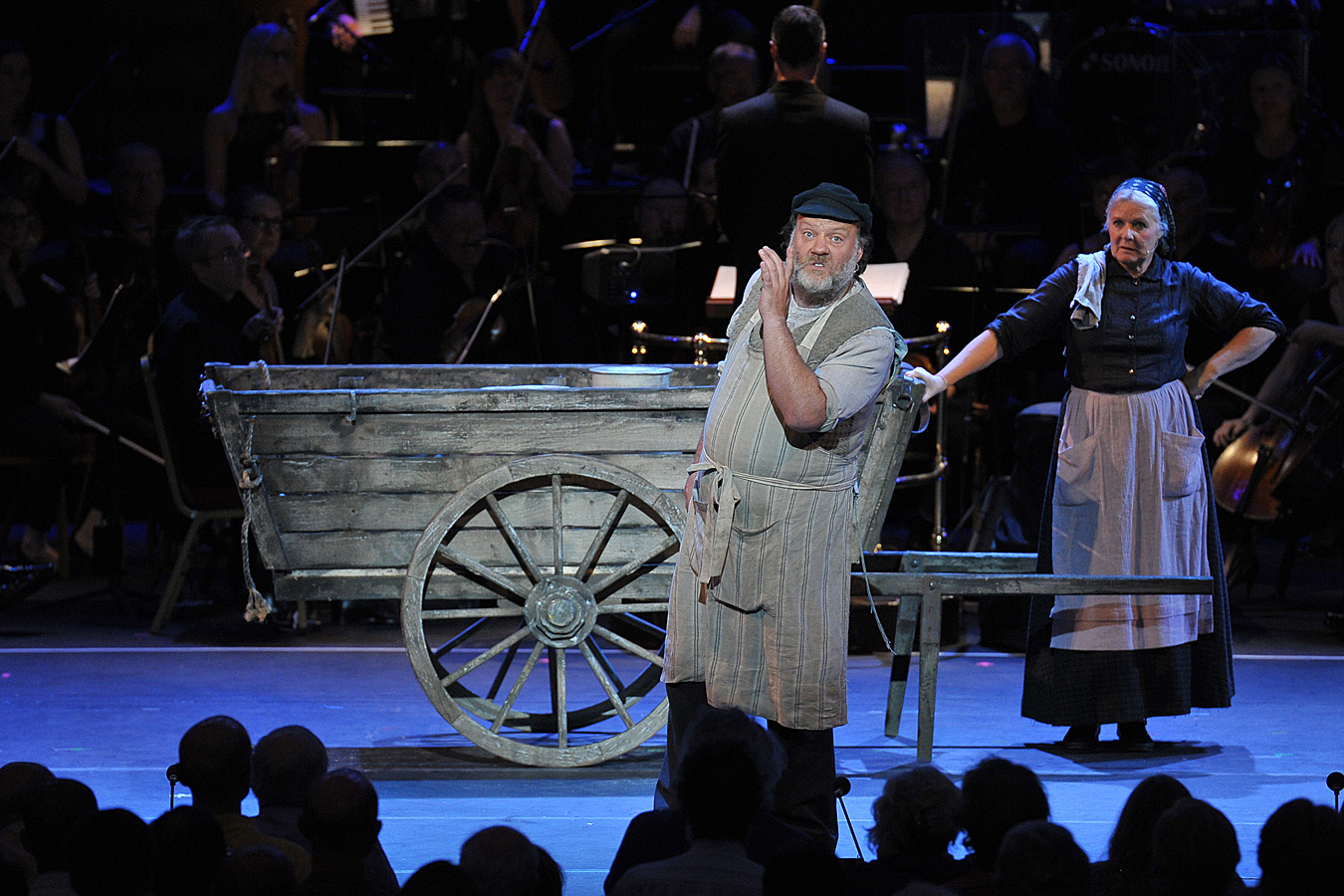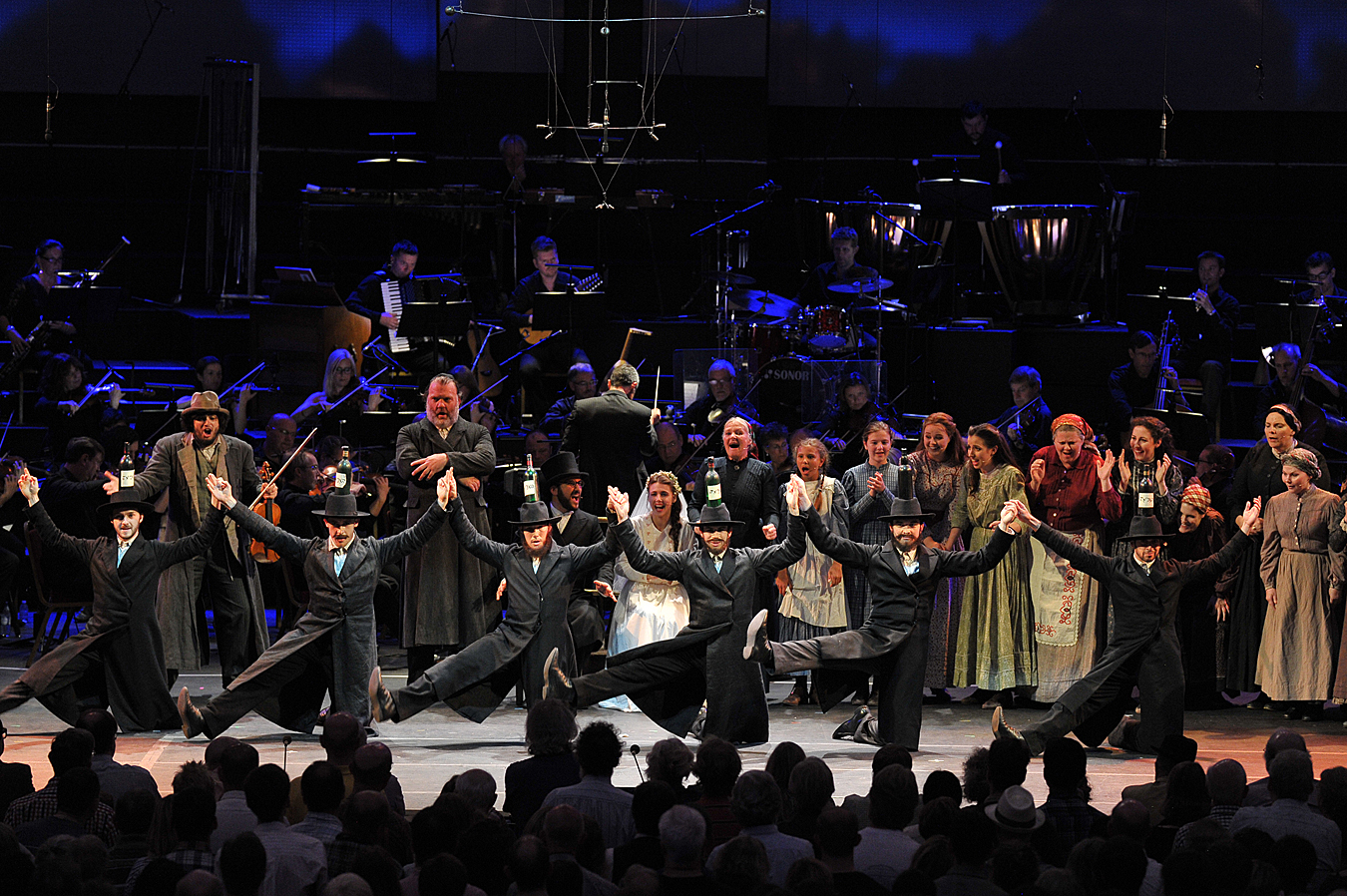Prom 11: Fiddler on the Roof, Grange Park Opera | reviews, news & interviews
Prom 11: Fiddler on the Roof, Grange Park Opera
Prom 11: Fiddler on the Roof, Grange Park Opera
Bryn Terfel's effortless Tevye hampered by amplification as the shtetl musical hits the Proms
Stop miking Bryn Terfel. Stop over-miking musicals; the show voices in a hybrid cast don’t need much. Too much ruined English National Opera’s recent Sweeney Todd, and in this Proms adaptation of Grange Park Opera’s summer crowd-pleaser it sent the voices ricocheting around the Albert Hall, making mush of the words and stridency of the few belt-it-out moments.
The idea of a shtetl show wasn’t at all a bad idea, and goes some way to accounting for Fiddler on the Roof’s enormous popularity on Broadway, where it ran for over seven years and over 3,000 performances. But Jerry Bock and Sheldon Harnick never found a meaningful way of binding together the Sholem Aleichem tales they selected. Despite the constant presence of a mournful fiddler (for Grange Park, Houcheng Kian, excellent), courtesy of Chagall, who hated the musical, and the various refrains of the opening number “Tradition” as that very supposed virtue falls apart, there’s no music for the real emotional core of the piece, or to lead the action forward, least of all in the two piecemeal finales.
Best is the klezmer style that gives a special flavour to ensemble chutzpah and an almost painful bittersweet quality, especially wistful in "Sunrise, Sunset" and beautifully underlined by David Charles Abell’s sensitive sway over an often luminous BBC Concert Orchestra (the miking at least doesn't harm them as it did the Britten Sinfonia in the turkey of last year's Proms, the horrible Rufus Wainwright late-night indulgence). Abell has tracked down Don Walker’s long-lost original orchestrations, with soulful roles for accordion, mandolin and lute; it’s not surprising if the score occasionally joins hand with Shostakovich in Jewish folk poetic mood.

Grange Park's supporting cast was good: Janet Fullerlove as the matriarch (pictured above with Terfel) brought much-needed pathos to her evasive answers in one of the only two numbers to stand out in Act Two, Tevye’s question “Do You Love Me?”, and Katie Hall struck the right note of pathos in the other, as the second of the five daughters to make her own marriage choice leaves to join her activist husband in Siberia. Jordan Simon Pollard as said idealist also managed to make something of one of the more anodyne numbers. The worst was an interminable scene in which Tevye fakes a nightmare to persuade his wife that another daughter should marry her beloved tailor and not the old butcher; it was mostly the miking’s fault if not a word could be made out of the two ghost-women in this narrative.
Other set-pieces worked better, thanks mostly to the superb negotiation of the space in front of the orchestra and dance routines (one pictured above) from the ever-dependable Lucy Burge, with just the right degree of Jewish and Russian nationalist traditional steps (Burge didn'tget a biography in the programme; nor did the original director Antony McDonald, though there was one for the Proms stager Peter Relton). At moments like this the spirits soared, but Fiddler on the Roof is too much a work of fits and starts for the magic to last for long. Bring back Grange Park Opera to the Proms, bring Garsington and Longborough too, but mike-free.
rating
Share this article
Add comment
The future of Arts Journalism
You can stop theartsdesk.com closing!
We urgently need financing to survive. Our fundraising drive has thus far raised £49,000 but we need to reach £100,000 or we will be forced to close. Please contribute here: https://gofund.me/c3f6033d
And if you can forward this information to anyone who might assist, we’d be grateful.

Subscribe to theartsdesk.com
Thank you for continuing to read our work on theartsdesk.com. For unlimited access to every article in its entirety, including our archive of more than 15,000 pieces, we're asking for £5 per month or £40 per year. We feel it's a very good deal, and hope you do too.
To take a subscription now simply click here.
And if you're looking for that extra gift for a friend or family member, why not treat them to a theartsdesk.com gift subscription?


Comments
I completely agree about the
I think you can blame the
I think you can blame the hopeless structure of the first act for that. Other musicals like Sweeney Todd hold the attention for just as long. I overheard comments like 'it was easier to stay awake during the second act' - even though it has far fewer good songs than the first.
Still curious to know if it sounded any better on the radio. I'll give it a listen.
Initially I was aware of the
I disagree about the miking,
As the first paragraph
As the first paragraph implied, it was a question of degree. For some operas like Carmen or The Magic Flute the dialogue can be discreetly miked while the singing is left alone. That could have worked here. Anyway, apart from Bryn they were still most of them overprojecting the dialogue which came across - I'm told - very artificially on the radio. It was ear-piercing from where I was sitting. Less miking, more naturalistic delivery would have been the answer.
The first line of your review
I've suggested the
I've suggested the compromise; ignore it if you like. But my final word would be that if Terfel sounded resplendent two years ago against a much bigger orchestra in the Barenboim Ring, he wouldn't have much of a problem unmiked here. As for dialogue, I don't remember anyone having a problem when Mackerras conducted an immortal G&S Patience at the Proms. I repeat: the sound almost made the ears bleed in the stalls and Arena.
I love Fiddler on the Roof.
One of the best shows I've
i found the amplification
An excellent evening's
Zzzz I left during Act 1 as I
You booked for Fiddler on the
so glad to have missed ir it